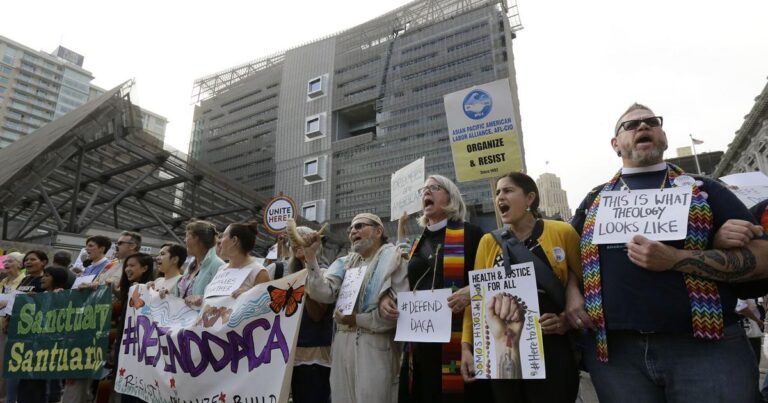San Francisco Prepares for Trump’s Leadership and Its Impact on Immigrants
As discussions intensify following President Trump’s electoral victory, communities of immigrants and minorities in San Francisco are mobilizing in anticipation of the challenges ahead.
Reactions to the Election Outcome
In the lead-up to the presidential election, analysts speculated about the possible influence of immigrant and minority voters on the election results. Many highlighted that their decisions could determine the outcome in pivotal swing states between Trump and Vice President Kamala Harris.
Following Trump’s unexpected victory, advocacy groups for immigrants quickly shifted their focus to addressing the potential repercussions, particularly since Trump has committed to implementing policies that could lead to widespread deportations and threaten sanctuary cities like San Francisco.
Local Perspectives and Resources
San Francisco’s leaders hold varying opinions on the anticipated outcomes under Trump’s leadership. While some express apprehension, others urge for a strategy grounded in past experiences of resistance during his first administration.
Mayor London Breed addressed the Board of Supervisors, noting that her administration has taken significant steps to bolster protections for immigrants. Initiatives include the expansion of the Office of Civic Engagement and Immigrant Affairs, alongside a 40% increase in funding for legal defense programs such as CARECEN SF.
“I believe in this city as one that will always stand for immigrants and their families,” said Breed. “We will not give in to fear.”
Concerns Over Resource Limitations
Despite the preparation efforts, advocates remain concerned about the city’s ability to address the challenges posed by a renewed Trump administration. Adrian Tirtanadi, executive director of Open Door Legal, pointed out the current struggle to meet the high demand for legal defense against deportation proceedings.
- Open Door Legal estimates a need for over $2 million in additional yearly funding to manage the existing cases.
- Successful representation significantly increases the likelihood of avoiding deportation.
- Approximately 40,000 undocumented immigrants reside in San Francisco, with a considerable number of U.S. citizens also living with undocumented individuals.
According to data from the California Immigrant Data Portal, about a third of San Francisco’s population is foreign-born, underscoring the severe economic implications of potential mass deportations.
Preparing for Possible Changes
City officials and community organizations are proactively strategizing in response to the looming threats. Key preparations include establishing a rapid-response hotline to report ICE activities and providing legal assistance promptly to those detained by immigration officials.
Francisco Ugarte, managing attorney at the Immigration Defense Unit, expressed optimism about San Francisco’s resilience during challenges. “San Francisco has a history of standing together against threats to our immigrant communities,” he stated.
The Latino Vote and Local Dynamics
Amidst these challenges, the implications of the electoral outcome are not solely confined to governance. The Latino community, a growing demographic, is under scrutiny as analysts explore voting patterns. Studies reflect that the Latino electorate is not monolithic, with some factions showing a willingness to support more diverse political views.
Research from UnidosUS suggests that the Latino vote did not singularly dictate the election results, emphasizing that broader economic issues like inflation resonate more profoundly within the community.



